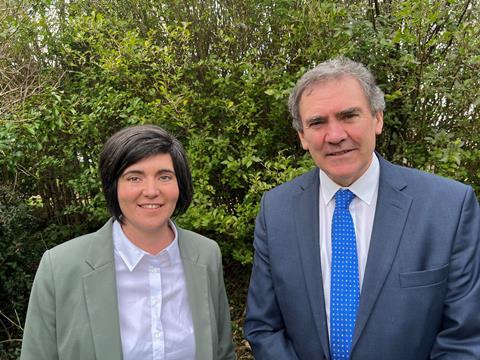NFU Cymru Conference 2023 focuses on producing food for the future in context of climate change

Ambitious Welsh farmers are perfectly placed to deliver healthy and nutritious, sustainable food alongside tackling climate change given the correct policy conditions and support frameworks.
That was the key message from NFU Cymru President Aled Jones when he opened the annual NFU Cymru Conference in Llandrindod Wells this morning (2 November).
Despite the considerable challenges facing the Welsh agriculture industry in the months ahead, Jones told the NFU Cymru Conference audience that farmers in Wales can still be optimistic about their future prospects and the multiple benefits the sector can provide for the people and communities of Wales.
Agriculture’s harmonious link with the environment and the industry’s efforts to tackle climate change are key themes for this year’s event, with the conference welcoming Dr Michelle Cain, UKRI Future Leaders Fellow and Senior Lecturer in Environmental Data Analytics at Cranfield University as one of its key speakers. The event also sees the union honour the third winner of the NFU Cymru/Wynnstay Sustainable Agriculture Award.
Taking the lectern on the NFU Cymru Conference stage this morning, Jones told the conference audience that climate change remains at the front of farmers’ minds. He stated that Wales’ maritime climate and topography mean the sector can be a ‘world-leader’ in the production of climate friendly food, feeding a growing population while meeting its climate change ambitions.
He said: “Climate change is the challenge of our time and NFU Cymru recognises that agriculture has a key role to play. Indeed, we were one of the first farming organisations in the world to set the ambitious goal of reaching net zero greenhouse gas emissions for agriculture by 2040.
“At the same time as reducing our impact on the climate, we should not reduce our capacity to feed consumers with high quality, affordable Welsh food.
“In its recent progress report for Wales, the UK Committee on Climate Change identified that progress towards decarbonisation has been too slow in areas of devolved competence.
“Back in March 2022, NFU Cymru alongside industry partners submitted proposals to Welsh Government for a Low Carbon Farming Framework to support the uptake of low carbon farming practices quickly and at scale on Welsh farms ahead of the transition to the Sustainable Farming Scheme. It is disappointing that these proposals have subsequently stalled within government. Momentum and the confidence of farmers in environmental delivery is fast dissipating with the ending of Glastir in December and many of our farmers facing the ‘cliff edge’ in funding we warned would happen if these contracts were not extended.”
Jones reiterated calls made by the union in a letter to the Minister last month for the introduction of a safety net mechanism for those hit hardest by the ending of Glastir.
The President also told the conference audience it is vital that the BPS budget is maintained for 2024. “We ask government to maintain the BPS budget for 2024, in order to maintain stability and certainty at a time of such uncertainty so farmers can continue doing what we do best, providing the consumer with safe, high quality and affordable food,” he said.
Looking to the future, Jones said: “As we approach a UK general election, we will be looking closely at the manifesto commitments of our political parties and what they say in relation to funding for farming over the next parliament. We need a multi annual commitment to a budget that ensures our food, climate and environmental ambitions can be realised.
“Most important of all, when I think of Welsh Farming: Producing for the Future, I think of our future farmers. What can we do to give our next generation the best opportunity to succeed, and how can we ensure that what we produce is the number one choice of consumers in Wales, across the UK and further afield.
“The next 12 months will see crucial decisions being made on the policy landscape in Wales that will determine and define the farming landscape for our generation and those that follow in our footsteps. It is so important we get this right. We all have a part to play in helping to shape Welsh farming as we continue to strive towards our ambition of being world leaders in the production of climate friendly food, supporting a healthy and thriving farmed environment whilst being the cornerstone of the economic, social and cultural wellbeing of our rural communities.”



